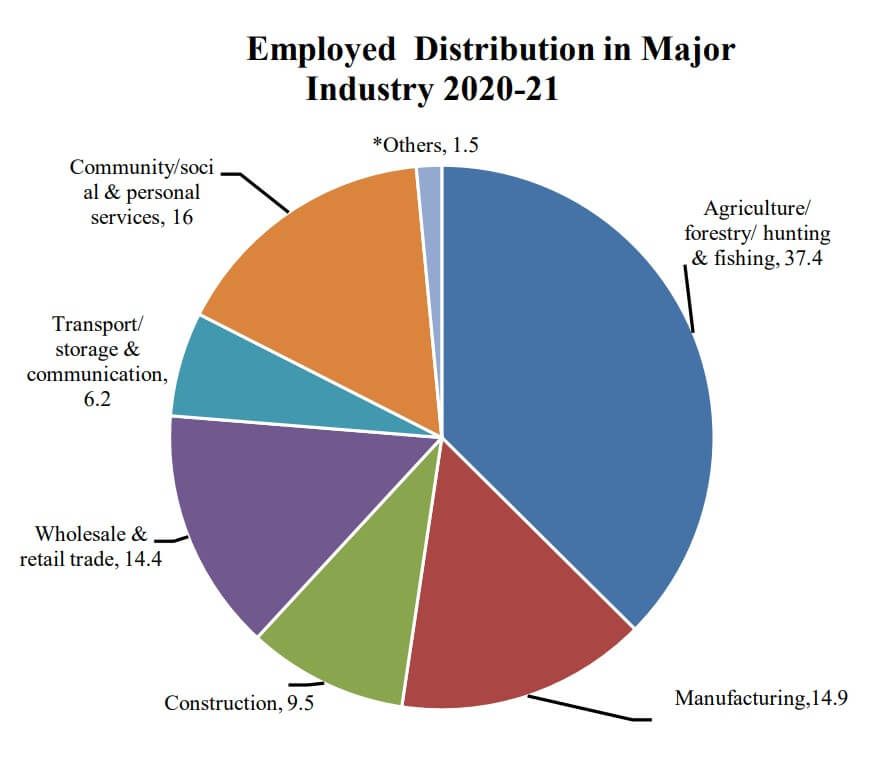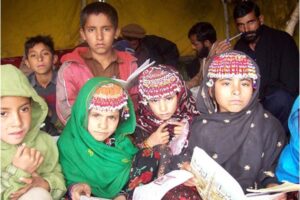
IFE Ideas and vision for Youth Policies
What can we do to ensure financial enablement of the youth? Problem with youth today is a majority may not have had availed the opportunity for gaining foundational literacy or educational acumen required by our industry/market or agricultural sector or social sector. Economic Survey 2020-2021 states quotes that the overall unemployment rate is 6.3 percent with prevalence of higher
unemployment rate 12.2 percent among 20-24 years.
Sector wise employment distribution as per ESP;

Current situation induced by inflation and other social/political uncertainties have resulted in dire conditions for the youth; who are burdened with financial responsibilities towards their households. With little exports and rising cost of manufacturing, many sectors are now under immense pressure to lay off more employees, where unskilled labor stand to lose the most.
The economic pressure is also forcing many households to pull their children out of schools so they can help their families survive. Which means that out of school children will spend their formative years without acquiring the skills that schools are supposed to provide for foundational literacy and numeracy. The productive years that are required to produce a quality, high skilled labour in coming
years is going into void, and it poses an imminent danger of losing productivity, whereas Pakistan’s relevance to competitive global markets will be lost for good if immediate steps are not taken now to secure and protect the interests of our children, youth and future generations to come in this country. The matter has now become a matter of Pakistan’s own survival.
IFE suggests that a stronger political resolve to address concerns of the youth and young adolescents, as well as children who are turning away from schools in order to seek livelihoods early on in their lives.
The perpetual cycle of unproductive engagement of the youth can only be broken when there is an acknowledgement that they need to be taken as the most important stakeholders in decision making. They need to feel empowered and confident in acquiring the required capabilities they need for progress of the self and that of the nation as its citizen.

IFE recommends interventions in Three Domains based on its understanding of intrinsic issues faced by the youth across Pakistan.
Domain 1: Economy and Finance
Skills and Opportunities for Enhancing Financial Capabilities
We must believe in the fact that learning and acquiring of skills is a lifelong process and one can acquire it at any stage or level in life. Age should not become a barrier to acquiring education and skills. Learning should be encouraged and incentive of better return should be promised.
- For the unskilled and uneducated youth: In order to help the youth to become financially enabled, it is important to open corridors for them to keep learning what is required to be learnt to stay relevant and in need by employable sectors. For the unskilled and uneducated
youth, there’s a need to bring them into Alternate Learning Pathways, with flexible modalities that can help them to gain skills as they work. A fast-track learning of foundational literacy and numeracy needs to be provided through any arrangements that can be managed for
them. The corporate social responsibility units must be made important service providers with incentives promised to them as in tax rebates or other concessions based on how they’ve empowered the youth through education or skills training. - For the educated, but unskilled youth: any restrictions, especially that of age, should be removed whenever a young person decides to continue with basic education at schools or diploma programs at tertiary levels. Special arrangements should be placed for them to avail many options of continued learning as they work. There is potential for productivity in the IT sector, where they can innovate and start up with businesses. Special IT skills courses must be made available, accessible and free by engaging industry and IT sector corporate social responsibility units.
Domain 2: Interactions with the State and Society
Civic Engagement and Social Coherence Skills
Skills for employment and financial generation are not the only skills our youth needs. In a highly polarized and toxic environment, there is a need to keep their interactions at all level healthy and productive. IFE suggests the following social skills that can be imparted through different mediums, including schools and public spaces, electronic media and news and media platforms.
- Civic Education: For one, can be imparted through practical lessons on the role expectation of citizens and their relationship.
- Social media, TV and entertainment media: Media policies should change its direction in showing better characters that abide by the rule of law and believe in peaceful democratic struggle for human rights or other social causes. What is the role of constitution, why democracy is important for reforms, what improves citizen and state relations, citizen to citizen relations and citizen to environment relations, and how peaceful struggles for human rights work should be the themes covered under civic education.
- Art of Dialogue & Communication: Freedom of expression is a fundamental right, and so is preservation of human dignity and their self-respect. Because of years of regressive school practices, policy directions at social engineering, dissent has been discouraged and demeaned. Youth programs must include establishing multiple forums where there are opportunities for them to interact and socialize with people coming from different backgrounds.
- A friendly online interface in our cultural flavor: Much like Facebook or LinkedIn, may be considered that can help enhance their communication, improve on vocabulary and develop confidence in expressing new ideas. Such interactive physical or virtual forums should be established with an aim to inform on implications of hate speech, and how a point can get across decently without hurting others.
- Skill to stay clear from fake news: Extreme political polarization is a result of unchallenged fake news spread in social and mainstream media. It is because many youths are not even aware of the facts that remain hidden from them and are persuaded to follow their “role models” without questioning them. This is where critical enquiry needs to be promoted. Critical enquiry is not the domain of schools and learning institutions only, but of the entire media industry as they are the sources of information that gets consumed by public at large. The Information Ministry needs to be involved in setting the right directions on disseminating facts-based, verified information.
Domain 3: Encouraging Progressive Mindsets
Activating Teachers to help Change Mindsets
At this point in Pakistan, entire education and learning paraphernalia needs a major shift from old conventions and ideologues, and steer towards progress, inclusivity and positivity. Factors in education systems responsible for creating divisiveness, such as in curriculum, textbooks and pedagogies, need to be eliminated. For the political leadership, it is important to pay more attention to education and teacher constituencies, to understand their needs and work on the promises they have made or are making to them.
- Recognize Teachers and Educators as a Constituency: One of the barriers to quality education is an under-resourced teacher, who has not been able to develop their abilities to optimal level. Many young volunteer teachers are however working to help
restore the spirit of learning in children and youth. Their labour issues, human rights concerns and academic freedom are also important considerations for our political and governmental stakeholders. - Recognizing Progressive Teachers as Role Models for Young Recruits: Many programs can be initiated to recruit such dynamic young teachers and train them properly on taxonomies and strategies for their students to develop critical thinking skills. Many local heroes, aka teachers, are best examples of inspiration for those concerned for education. Their localized interventions and the positive results should be adapted in training programs.
Tag:Barriers to Education, civic education, civic skills, invisible barriers to education, media policies, ministry for education and professional training, Peace Education, productive engagement of youth, secular studies, soft skills, teachers as peace agents, youth bulge, youth policies, youth unemployment



